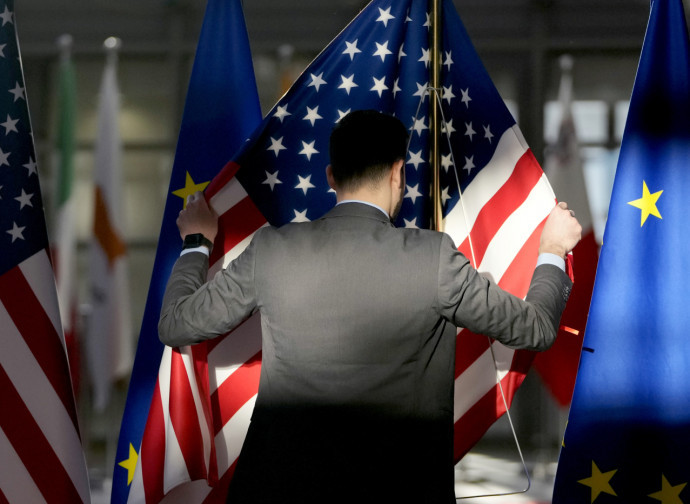The US still needs Europe but only if it remains free
On 27 May, Samuel Samson, a 26-year-old senior advisor to the Department of State's Bureau of Democracy, Human Rights and Labour, published an official newsletter outlining the Trump administration's relations with Europe. It immediately caused a scandal, with calls for regime change. Like JD Vance's speech in Munich, it is actually a warning to Europeans not to betray their cultural roots.

Samuel Samson, a senior adviser to the Department of Democracy and Human Rights, released an official newsletter on 27 May outlining the Trump administration's relations between the US and Europe. The Need for Civilisational Allies in Europe'. It is a programme text with strong theoretical content, written in a frank and direct tone. However, it is not a declaration of war, as many have misinterpreted it to be.
This week, Samson's document caused quite a stir among commentators and politicians on both sides of the Atlantic. One example is the review article written by Professor Fabio Sabatini, a lecturer in political economy at La Sapienza University in Rome. It contains all the arguments of those horrified or frightened by the Trump administration. Regarding the document itself, Sabatini says: 'Such is the reversal of reality that it seems to have come from the pen of a postmodern Goebbels or a reactionary Stalin'. He sums it up as follows: 'In short, the Trumpified State Department considers today's Europe to be an ideological enemy and identifies its internal opponents (i.e. the radical right) as the only legitimate partners for US diplomacy. It hopes for regime change, but a soft one: not by force, but through the ballot box (if things go as hoped).”
Samson's document begins by stating the opposite, however: that the US and Europe are and will remain allies of civilisation. 'The close relationship between the United States and Europe transcends geographical proximity and transnational politics. It represents a unique bond forged by a common culture, faith, family ties, mutual assistance in times of difficulty, and above all, a shared Western cultural heritage”. In other words: 'Our transatlantic partnership is underpinned by a rich Western tradition of natural law, virtue ethics, and national sovereignty.' This tradition has its roots in Athens and Rome, passes through medieval Christianity and English common law, and finally arrives at America's founding documents. The Declaration's revolutionary assertion that men 'are endowed by their Creator with certain unalienable rights' reflects the ideas of Aristotle, Thomas Aquinas and other significant European thinkers.'
This document is not written from an ideological perspective by enemies, as was the case with the conflict between the US and the USSR, but rather by a disappointed friend who begins by saying: 'This bond between Europe and the United States is also why we speak honestly when we disagree or have concerns'.
The disappointment stems from the fact that Europe is becoming less and less free. It is therefore becoming increasingly distant from its tradition. The most striking example is the United Kingdom, the cradle of Western liberalism. In the UK, Christians such as Adam Smith-Connor and Livia Tossici-Bolt have been arrested for praying silently outside abortion clinics. In 2023, over 12,000 British citizens were arrested for online posts, including critical comments on the European migration crisis which the authorities deemed 'seriously offensive'. On a continental scale: The European Union's Digital Services Act, presented as a tool to protect minors from harmful online content, is instead being used to silence dissenting voices through Orwellian content moderation.
Following restrictions on freedom of religion and expression, we are also witnessing a decline in political freedom. In Germany, the popular Alternative für Deutschland party has just been labelled an 'extremist' organisation by the secret services, which could lead to the party's dissolution. In France, French presidential candidate Marine Le Pen has been accused of embezzlement and, in a departure from standard procedure, has been immediately excluded from the election race. As we have discussed several times in these columns, Brussels (and the American left itself) has interfered in the 2025 presidential elections in Poland and Romania.
Samson's alarm echoes the speech given by Vice President JD Vance at the Munich Security Conference. It is a well-founded alarm. However, this is not understood by an educated class that now only thinks in terms of positive law, ignoring natural law (which pre-exists the state), and therefore seeing nothing wrong with heavy-handed interventions by the EU or the British Prime Minister. The attitude is that if the law says so, then it's okay. Take Josef Ernst, an author for the newspaper The Globalist: 'These examples do not indicate a failure of democratic governance. On the contrary, they demonstrate that France is upholding the law and that Germany is defending constitutional principles relating to extremist political activities. In both cases, the rule of law is doing exactly what it was designed to do”.
From this perspective, based on this ambiguous definition of 'rule of law' (understood as the 'producer' of law), any freedom can be repressed if the state itself prescribes its repression through law.
“Our concerns are not partisan, but principled,” concludes Samson. ‘The suppression of freedom of expression, the facilitation of mass migration, the persecution of religious expression, and the weakening of electoral freedom threaten the very foundations of the transatlantic partnership.’
Yet the conclusion is optimistic: 'We will not always agree on the scope and tactics, but concrete action by European governments to ensure the protection of political and religious freedom of expression, border security, and fair elections would be a positive step forward'. In short, there is no regime change in sight. However, it is a warning that we would do well to heed.
